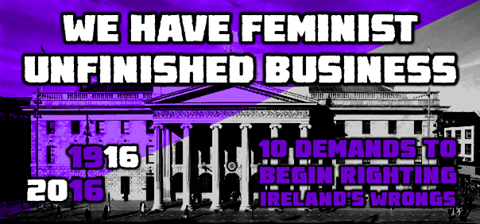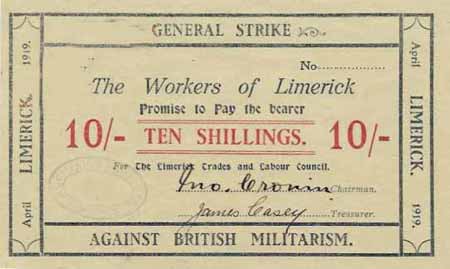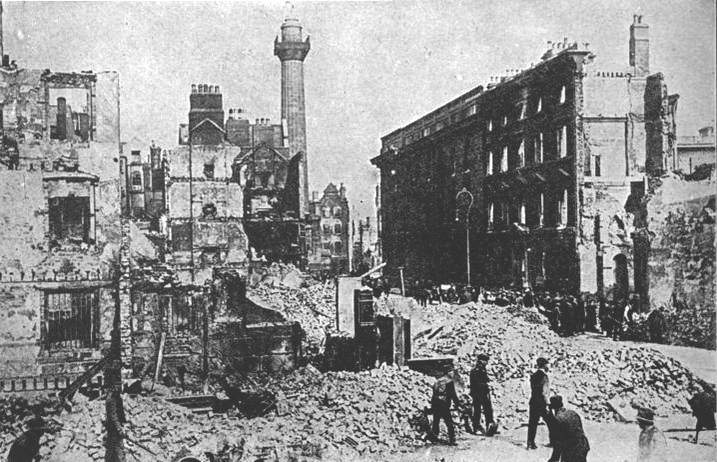Over 30 years of anarchist writing from Ireland listed under hundreds of topics
1916
Feminist unfinished business - 1916-2016 - 10 demands to begin righting Ireland's wrongs
 With historic working class centenaries occurring in recent years we have heard a lot about Unfinished Business. This message was strong in 2013 in reference to the 1913 Lockout and the inequality that still prevails in Ireland. Cries of Unfinished Business are once again being proclaimed in this centenary year of the 1916 Rising and it is true, we do have unfinished business.
With historic working class centenaries occurring in recent years we have heard a lot about Unfinished Business. This message was strong in 2013 in reference to the 1913 Lockout and the inequality that still prevails in Ireland. Cries of Unfinished Business are once again being proclaimed in this centenary year of the 1916 Rising and it is true, we do have unfinished business.
We still have bosses and businessmen who could give William Martin Murphy a run for his money. The Republic that the rebels envisioned and enshrined in the proclamation has not been achieved and despite the rhetoric of the YES campaign we do not “cherish the children of the nation equally”, and we have a long way to go to get there, with particular work needed on Ireland’s hatred of women.
A world to change in 2016
 We awake to news that more towns in Ireland are under water due to storm flooding. And that perhaps the sea ice at the north pole might melt due to temperatures rising above zero. The first story is given a lot more prominence in Irish media than the second but strangely at the same time another story is being celebrated. The start of yet more greenhouse gases being pumped out of their safe place far below the sea off the Irish shore to be processed and then released into the atmosphere via the Corrib refinery.
We awake to news that more towns in Ireland are under water due to storm flooding. And that perhaps the sea ice at the north pole might melt due to temperatures rising above zero. The first story is given a lot more prominence in Irish media than the second but strangely at the same time another story is being celebrated. The start of yet more greenhouse gases being pumped out of their safe place far below the sea off the Irish shore to be processed and then released into the atmosphere via the Corrib refinery.
100 years after 1916 will the Irish state recognising Traveller ethnicity
2016 is fast approaching and we will be subjected to endless documentaries about that start of our bloody history as a nation. It will also be a time for analysis of how far we’ve come since the proclamation of this Republic.
In the proclamation there are lines which are aspirational, but grounded in the reality of experience of the rebels.
“The Republic guarantees religious and civil liberty, equal rights and equal opportunities to all its citizens, and declares its resolve to pursue the happiness and prosperity of the whole nation and of all its parts, cherishing all of the children of the nation equally, and oblivious of the differences carefully fostered by an alien Government, which have divided a minority from the majority in the past.”
Anarchist report from 1916 Easter Commemorations in Belfast
 This year marked the 96th anniversary of the Easter Rising traditionally a time when republicans across this island come out to remember the sacrifice of fallen comrades and renew their ideals set in stone in the 1916 proclamation. It is also a time when rival republican groups set out there stall in a show of strength and support; but what is noticeable in so-called republican heartlands is a decline in overall attendance and of the wearing of the Easter lily and houses flying the tri-colour.
This year marked the 96th anniversary of the Easter Rising traditionally a time when republicans across this island come out to remember the sacrifice of fallen comrades and renew their ideals set in stone in the 1916 proclamation. It is also a time when rival republican groups set out there stall in a show of strength and support; but what is noticeable in so-called republican heartlands is a decline in overall attendance and of the wearing of the Easter lily and houses flying the tri-colour.
Captain Jack White on the Easter rising
These opinions and reactions are just a small sample of what is out there. This Easter Week, we should look at the event not just as a week long insurrection, but as an event that would ricochet on through the troubles that followed and continue to spark debate long after the last bullets whizzed through the Dublin sky.
The 1916 rising and class struggle in Ireland 1886-1923

Articles on 1916, the War of Independence and related issues published by the WSM as well as material by other anarchists and documents from the period.
Image: Money issued by the 1919 Limerick Soviet
James Connolly - A life and a legacy
Revolutionary martyrs, being unable to speak for themselves, are liable to be claimed by all sorts of organisations with whom in real life they would have had little in common. When they are of national or international importance, like the Irish syndicalist James Connolly, this also mean that biographies often tend to be very partisan affairs, aimed at recruiting the dead to one cause or another. The story of their life becomes reduced to a morality tale whose conclusion is whatever positions the author holds dear today.
The insurrection of Easter 1916

The Easter 1916 rising in Dublin is often portrayed simply as nationalist blood sacrifice but it can also be examined as an insurrection which was seriously planned to defeat the British army. It is credited with transforming political attitudes in Ireland, leading to the partally successful war of independance but nationalist histories tend to understate the other reasons why the situation was transformed and to completely ignore the wave of workers struggles that broke out during the war.
The Easter Proclamation
Easter Proclamation, read by Pádraig Pearse outside the GPO, Dublin at the start of the Easter Rising, April 24 1916.
Constitution of the Irish Citizen Army

As agreed at a public meeting, held Liberty Hall 22 March 1914 from a draft prepared by Sean O’Casey.

